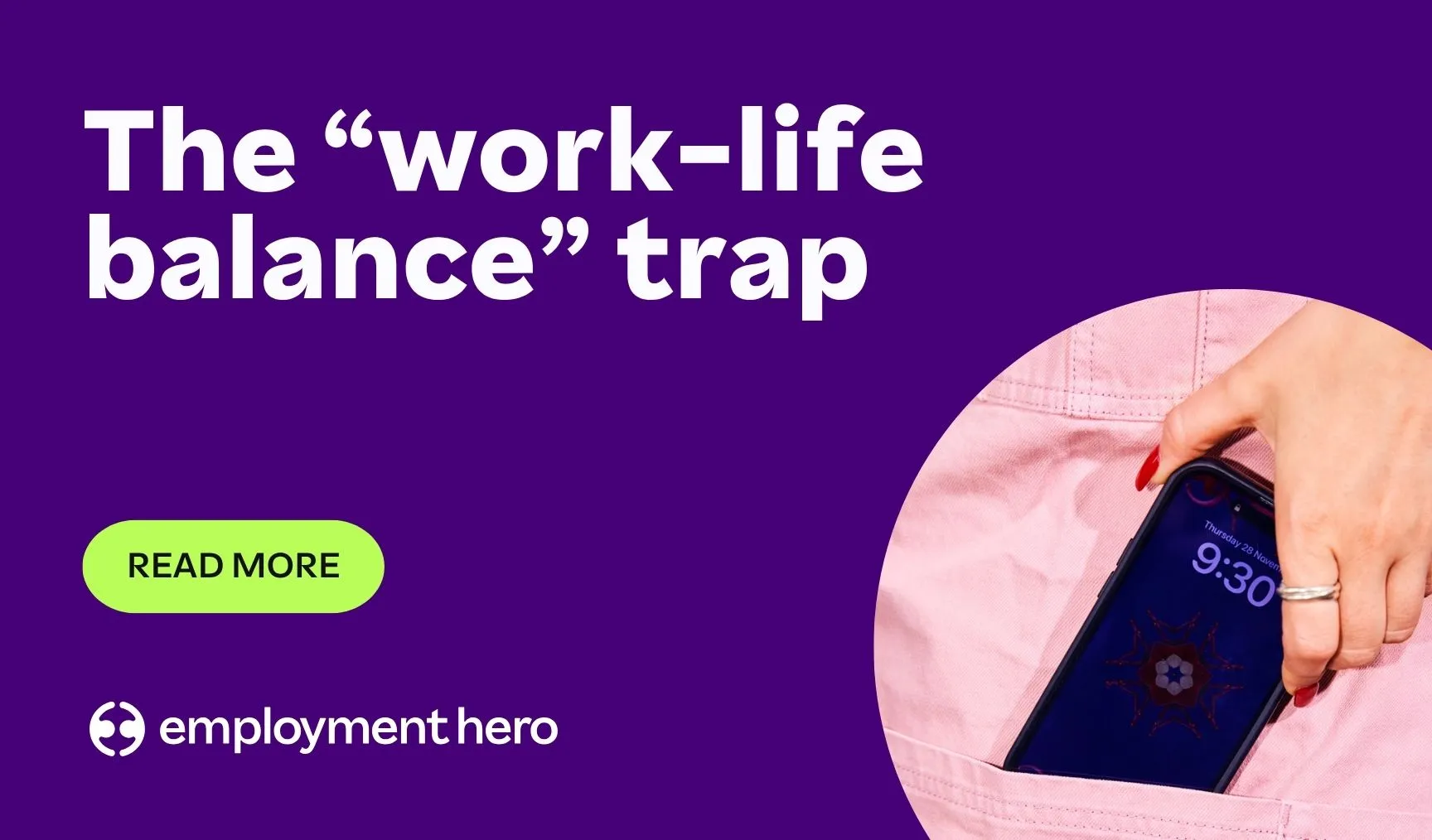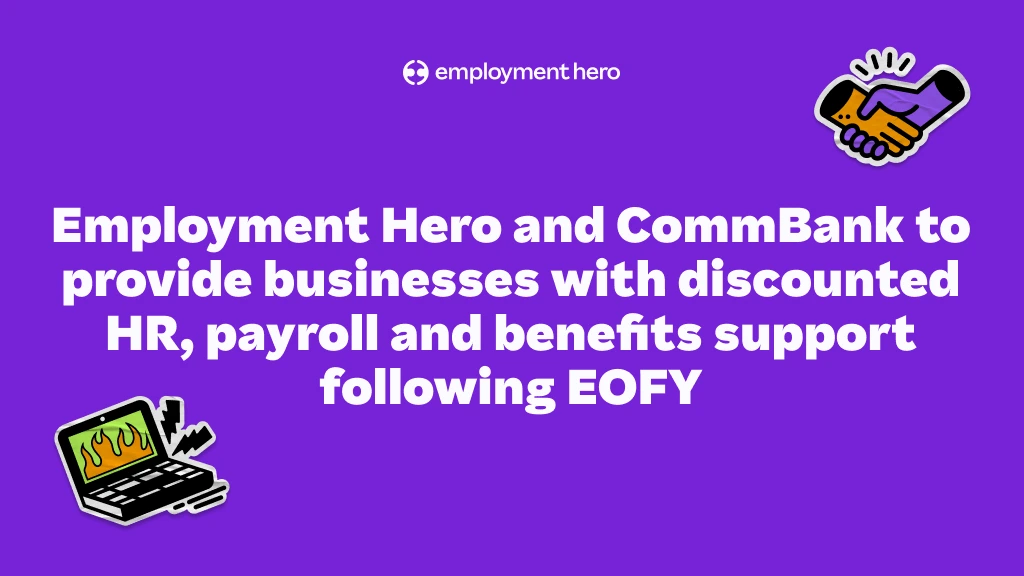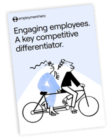How to give constructive interview feedback to candidates
Put bluntly, it’s bad practice to not give candidate feedback, so here’s how you can, even if you have candidates coming out of your proverbial ears.

Everyone has experienced being ghosted after an interview. It feels bad. You’re forced to continue looking for jobs in limbo wondering if you’ll get a callback or not; plus, you’re none-the-wiser on where you fell short or how you can improve.
Why should employers give feedback to unsuccessful candidates?
Offering feedback to unsuccessful candidates isn’t just about providing closure; it’s an opportunity to help individuals grow and maintain a positive image of your company in the eyes of job seekers. According to our guide on candidate engagement strategies, building a positive candidate engagement experience can significantly improve your hiring process and make your company stand out from the crowd.
It promotes a culture of respect, empathy and professional development. And in today’s tough recruiting environment, how you invest in your candidates could be just as valuable as how you invest in your new starter. Especially if you have more roles to offer in the future. After all, there’s always more than one good candidate for each role.
One common challenge during recruitment is candidate ghosting, where job seekers suddenly disappear from the hiring process. Understanding the reasons behind this can help in providing timely and constructive feedback.
How can hiring managers provide feedback effectively with a high volume of candidates?

Providing effective candidate feedback while managing a high volume of candidates means following a set process. You could also call on tools like ChatGPT to expand on your feedback or help you clarify your thinking.
Here are some ways hiring managers can handle this challenge:
Standardise feedback templates: Create predefined feedback templates or forms that cover key aspects of the interview process. These templates can include sections for strengths, areas of improvement and overall impressions. You could customise them per role or interview stage to help streamline the feedback process.
Focus on key points: Concentrate on highlighting the most critical aspects of each candidate’s performance. Identify key strengths and a couple of areas for improvement that are most relevant to the role.
Use rating systems: Use a rating scale (e.g., numerical or qualitative) to evaluate candidates on essential criteria. This helps in providing concise feedback and ensures consistency across evaluations.
Immediate documentation: Immediately after an interview, jot down key observations or use voice-to-text tools to record your thoughts. This minimises the chance of forgetting important details and makes it easier to provide feedback later.
Delegate feedback responsibilities: If possible, distribute feedback responsibilities among the interview panel. Assign specific aspects or questions to individual panel members, and then collate their insights to provide comprehensive feedback.
Prioritise follow-up: Focus on providing detailed feedback to final-stage candidates or those who have invested more time in the process. For earlier stages or less promising candidates, concise feedback is still essential but can be more general.
Automate where possible: Consider using an applicant tracking system (ATS) or interview management software that allows for automated feedback generation based on predefined criteria or responses. Incorporating an ATS can also streamline the process of scheduling interviews and ensure a smoother experience for candidates.
Offer group feedback sessions: When multiple candidates exhibit similar strengths or weaknesses, consider group feedback sessions where general observations are shared. This method can save time while providing valuable insights.
Set clear timeframes: Establish a standard timeframe for providing feedback after interviews. Communicate this to candidates, managing their expectations and ensuring a prompt response despite a high volume of interviews.
Balance quantity with quality: While managing a high volume of interviews, prioritise quality feedback over quantity. Focus on delivering meaningful, actionable insights rather than lengthy feedback.
Effectively managing feedback during high-volume hiring ensures candidates receive valuable insights while also streamlining the hiring process for your hiring team.
Best practices when giving interview feedback

Start with positives
Begin your feedback by highlighting the candidate’s strengths and positive aspects of their interview. For instance, “John, your experience in project management was evident, and your examples showcased strong leadership skills.”
Be specific
Offer detailed examples to illustrate your points. For example, “During the discussion on your previous role’s challenges, I appreciated how you elaborated on the strategies you implemented. However, providing specific quantifiable results would have further highlighted your achievements.”
Focus on improvement
Suggest areas where the candidate can enhance their performance. For instance, “Sarah, your communication skills are strong, but try to slow down your speech slightly to enhance clarity. Additionally, providing more diverse examples could demonstrate a wider skill set.”
Encourage self-reflection
Ask open-ended questions to prompt candidates to reflect on their interview performance. For instance, “How do you think your technical expertise could be better communicated in future interviews?” This encourages candidates to think critically about their performance.
Offer resources
Provide resources or advice for improvement, such as suggesting relevant workshops, online courses, or industry-specific materials. For instance, “Jack, there are some excellent public speaking courses available online that could help refine your presentation skills further.”
Maintain professionalism and empathy
Ensure your feedback is delivered in a respectful and empathetic manner, focusing on observations rather than personal opinions. “Emma, while discussing your teamwork experiences, your examples were insightful. However, incorporating more recent collaborative projects might better showcase your current abilities.”
Follow-up communication
Encourage candidates to reach out for further clarification or guidance, promoting an open communication channel. This demonstrates your willingness to assist in their improvement journey even post-interview.
A comprehensive interview guide can provide hiring managers with further tips and best practices for conducting effective interviews and providing constructive feedback.
Here’s a mock real-life scenario that brings some of that above advice to life. During an interview for a marketing role, the candidate showcased excellent creativity in campaign ideation. However, they struggled to provide concrete data on the campaign’s success. If you were providing feedback to this candidate, you might say: “[name], your ideas for the marketing campaigns were impressive. Yet, quantifiable metrics that show the impact of those campaigns would strengthen your ideas, showcasing both your creativity and demonstrating measurable success.”
Feedback like the above shows that you’ve picked up on their strengths, while giving them something to think about for their next interview or campaign pitch.
3 positive interview feedback examples
As a candidate progresses to the next stage of interview, or you’re one step closer to giving them an offer, it’s always good to pass on positive feedback. Here’s some examples of how you could do that:
A focus on the knowledge of the role and your company:
Dear [Candidate’s Name],
I wanted to express my appreciation for your excellent performance during the initial interview for the [Job Position] role. Your depth of knowledge and enthusiasm for [specific aspects of the role or company] was evident and highly impressive.
Your comprehensive understanding of [mention a specific area discussed, e.g., industry trends, technical skills] stood out, showcasing your expertise and readiness for the challenges associated with the position. Additionally, your articulate communication and thoughtful responses demonstrated your ability to effectively convey complex ideas.
We’re pleased to inform you that you’ve been selected to proceed to the next stage of our interview process. In the upcoming rounds, we look forward to exploring further how your skills and experiences align with the requirements of the role.
Congratulations on your progress, and we anticipate continuing our discussions with you.
Best regards,
[Your Name]
[Your Title]
[Company Name]
A focus on skills they’d demonstrated:
Dear [Candidate’s Name],
I wanted to extend my gratitude for your participation in the recent interview for the [Job Position] at [Company Name] and give you some positive feedback. Your interview performance was outstanding, particularly your ability to provide detailed examples illustrating your accomplishments in [specific areas discussed, e.g., project management, problem-solving].
Your insightful approach to [mention any standout skills or experiences discussed, e.g., team collaboration, innovative solutions] was remarkable and resonated well with our company’s values and goals.
Based on your impressive performance, we’re excited to invite you to the next stage of our selection process. This phase will involve more in-depth discussions and assessments to explore further how your expertise aligns with our team’s needs.
Congratulations on advancing to the next stage, and we eagerly anticipate continuing our conversation with you.
Warm regards,
[Your Name]
[Your Title]
[Company Name]
Focus on practical examples given:
Dear [Candidate’s Name],
I hope this message finds you well. I wanted to take a moment to commend you on your exceptional performance during the recent interview for the [Job Position] role at [Company Name].
Your insightful responses and practical examples demonstrating your proficiency in [mention specific skills or experiences discussed, e.g., strategic planning, client relations] were truly impressive. Your ability to [highlight a particularly commendable quality or achievement discussed] showcases your potential to contribute significantly to our team.
We’re delighted to inform you that you’ve successfully advanced to the next phase of our interview process. The subsequent rounds will allow us to delve deeper into how your skills and background align with the requirements of the role.
Congratulations on this achievement, and we look forward to our upcoming discussions.
Best regards,
[Your Name]
[Your Title]
[Company Name]
These examples show the candidate’s strengths and express enthusiasm for their progression in the interview process, fostering a positive rapport and anticipation for the next stages.
3 examples of constructive interview feedback for candidates not progressing

When you’re giving written feedback, especially what could be considered negative feedback, it’s important to have a script or structure to reach for so you don’t muddle your words. Avoiding negative feedback altogether and aiming for constructive criticism is best for all involved parties.
Didn’t provide enough practical examples:
Dear [Candidate’s Name],
Thank you for taking the time to interview for the [Job Position] at [Company Name]. We appreciate your interest and enthusiasm for the role.
While discussing your experiences, we observed that while your technical knowledge in [specific area] was solid, there were instances where providing detailed examples or practical applications of this knowledge could have further strengthened your responses. Additionally, enhancing your ability to [mention specific skills or areas needing improvement, e.g., time management, prioritisation] could significantly benefit your effectiveness in this role.
At this stage, we have decided to proceed with other candidates whose experiences more closely align with the specific requirements of the position. We encourage you to reflect on our discussion and consider opportunities to further develop the areas we discussed.
Thank you again for your interest in joining our team, and we wish you all the best in your future endeavours.
Kind regards,
[Your Name]
[Your Title]
[Company Name]
Didn’t detail experience to the required level:
Dear [Candidate’s Name],
I wanted to extend my appreciation for your participation in the interview process for the [Job Position] at [Company Name].
While your enthusiasm for the role was evident, during our discussions, we noted areas where further elaboration on your experience, especially in [mention specific areas, e.g., leadership roles, technical expertise], would have provided a more comprehensive understanding of your capabilities. Additionally, refining your approach to [mention specific skills or aspects needing improvement, e.g., problem-solving, adaptability] could enhance your readiness for similar roles.
Following careful consideration, we’ve decided to proceed with other candidates whose qualifications more closely align with our current requirements. We encourage you to use this experience as an opportunity for self-reflection and further skill development.
Thank you for your interest in joining our team, and we wish you success in your future pursuits.
Warm regards,
[Your Name]
[Your Title]
[Company Name]
Needed further evidence of industry awareness:
Dear [Candidate’s Name],
I hope this message finds you well. I want to express our gratitude for your interest in the [Job Position] and for participating in the interview process at [Company Name].
While discussing your experiences and qualifications, we noticed areas where additional emphasis on [mention specific areas, e.g., practical application of skills, industry knowledge] could have strengthened your candidacy. Also, honing your ability to [mention specific skills or areas needing improvement, e.g., communication, problem-solving] would be beneficial for roles similar to the one you applied for.
After careful consideration, we’ve chosen to proceed with other candidates whose backgrounds more closely match the requirements for this position. We encourage you to utilise this feedback as a guide for future opportunities and wish you continued success in your career endeavours.
Thank you again for your interest, and we appreciate the time you invested in the interview process.
Best regards,
[Your Name]
[Your Title]
[Company Name]
These examples aim to provide constructive feedback to candidates, highlighting areas for improvement while expressing appreciation for their interest and participation in the interview process.
How do you handle resistance from candidates when giving feedback?

When candidates dispute or don’t agree with the feedback they receive, try to see things from their point of view and be ready to communicate clearly but firmly. Here are some pointers on how you can address candidates in such scenarios:
Listen actively: Encourage the candidate to express their perspective and concerns regarding the feedback they received. Show empathy and actively listen to their points without interrupting, allowing them to share their thoughts fully.
Seek clarification: Politely ask for specific examples or instances where the candidate feels the feedback doesn’t align with their experiences or performance during the interview. Requesting concrete details can help in understanding their viewpoint better.
Stay objective: Remain neutral and focus on the facts rather than personal opinions. Reiterate that feedback is often subjective and based on individual perceptions and observations, and the intention is to provide constructive insights for improvement.
Explain the process: Briefly explain the interview process and how multiple perspectives might contribute to the feedback provided. Mention that the feedback is a collective assessment based on observations and discussions from the interview panel or relevant stakeholders.
Acknowledge their views: Validate the candidate’s feelings and perspectives. Even if there may be disagreements, acknowledge that everyone may interpret situations differently and that their viewpoint is important.
Offer an open discussion: Encourage an open dialogue and offer to discuss specific instances or concerns in more detail. This might involve revisiting particular aspects of the interview or providing further context behind the feedback.
Highlight areas of agreement: If there are points in the feedback that both parties agree upon, emphasise those and use them as a starting point for discussion or improvement.
Focus on moving forward: Emphasise the importance of using feedback constructively, regardless of agreement, as a tool for growth and development. Encourage the candidate to reflect on the feedback provided, even if they disagree, to consider areas where they could potentially improve.
Offer future opportunities: Assure the candidate that this particular feedback doesn’t hinder their potential for future opportunities within the company. Reiterate that feedback is part of the learning process and that their candidacy will be considered fairly in the future.
Maintain professionalism: Regardless of the outcome of the discussion, maintain a professional and courteous tone throughout the conversation. Express appreciation for their openness and willingness to discuss the feedback.
Remember, handling disagreements over feedback requires patience, empathy, and a willingness to engage in open dialogue to ensure a respectful and productive conversation.
Streamline your interview process with an applicant tracking system (ATS)
If you’re looking for an extra helping hand when it comes to finding and interviewing talent, maybe you could give our ATS a go? Incorporating an Applicant Tracking System into your hiring process not only streamlines candidate management but also makes giving feedback a breeze.
With our centralised platform and customisable templates, our ATS ensures organised records and swift, personalised feedback distribution. This tech isn’t just about efficiency; it’s a gateway to nurturing positive candidate experiences, even for unsuccessful applicants. By providing clear, prompt and constructive feedback, your company not only cultivates a supportive image but also encourages future applications and referrals, reinforcing the importance of ATS in modern recruitment strategies. You can try our ATS for free too!
We hope that both our advice and tools help build better relationships with your candidates, regardless of whether they’re successful in their application or not.
Related Resources
-
 Read more: The ‘work-life balance’ trap: Why promising it is hurting your SME recruitment (and what to promise instead)
Read more: The ‘work-life balance’ trap: Why promising it is hurting your SME recruitment (and what to promise instead)The ‘work-life balance’ trap: Why promising it is hurting your SME recruitment (and what to promise instead)
For growing SMEs, work-life integration is a sustainable way to support your team and attract top talent. Explore how your…
-
 Read more: Job ad guide: How to attract top candidates
Read more: Job ad guide: How to attract top candidatesJob ad guide: How to attract top candidates
Looking to hire your perfect match? The way you pitch your open role can be the difference between landing or…
-
 Read more: Employment Hero and CommBank to provide businesses with discounted HR, payroll and benefits support following EOFY
Read more: Employment Hero and CommBank to provide businesses with discounted HR, payroll and benefits support following EOFYEmployment Hero and CommBank to provide businesses with discounted HR, payroll and benefits support following EOFY
Eligible CommBank Yello for Business customers will get the first 3 months free on any Employment Operating System subscription with…






















